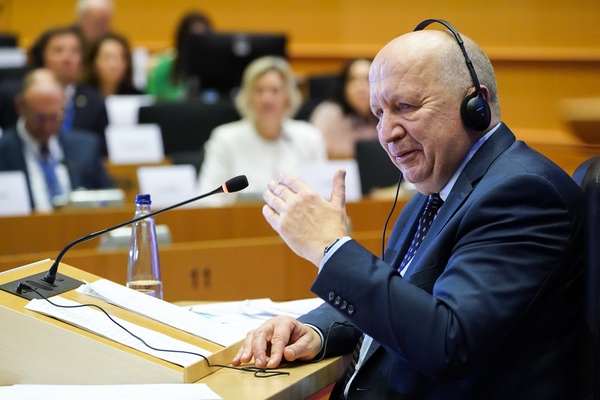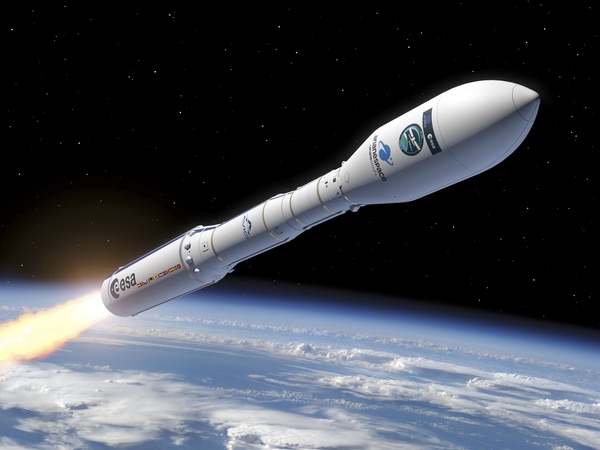Europe weighs its future in spaceby Jeff Foust
|
| “If we should need one more motivation for developing European autonomy, we have now, after the election, every reason to do so,” Bovenschulte said. |
That range of reactions was on full display at the Space Tech Expo Europe conference in Bremen, Germany, two weeks after the US election. While some worried about the potential disruptive impact a Trump administration might have on space, particularly if SpaceX CEO continues his advisory role, others saw an opening for European governments to do more in space.
“It’s not really a reassuring thought being dependent on someone like Elon Musk,” said Andreas Bovenschulte, president of the senate and mayor of Bremen, during a side event at the conference.
Europe has, to some degree, been dependent on Musk’s SpaceX for space access. Since the beginning of July 2023, Europe has conducted just four orbital launches: the final Ariane 5 launch that July, the first Ariane 6 launch a year later, and the final two launches of the original version of the Vega. SpaceX has, during that time, performed five Falcon 9 launches for ESA and the European Commission alone: three ESA science missions and two launches of pairs of Galileo navigation satellites. (In the first of those Galileo launches, the Commission referred to the Falcon 9 only as “the launcher,” hiding the fact that Europe had to launch those satellites from America.)
That “launcher crisis” is ending, with the Vega C slated to make its return to flight this week, nearly two years after a failure blamed on the nozzle of the solid-fuel motor in its second stage. “This is an important step for Europe’s independent access to space, or, let’s say, reestablishment of this independent access to space,” Toni Tolker-Nielsen, ESA’s director of space transportation, said of the Vega C’s return to flight at a briefing last week.
For some European officials, though, that reliance on SpaceX stings more than ever even as Europe restores its space access capabilities. “If we should need one more motivation for developing European autonomy, we have now, after the election, every reason to do so,” Bovenschulte said. “The goal of space autonomy will gain more traction in the next weeks and months, and I think that’s a good development.”
The concept of greater European support for its own space capabilities, be it launch or elsewhere, was a theme at the conference. “Team Europe needs to wake up,” Mathieu Bailly, vice president of CYSEC, a European space cybersecurity company, said on one panel. “You want to rely on your own systems and capabilities.”
An example of that, he said, was the European Union’s Infrastructure for Resilience, Interconnectivity, and Security by Satellite, or IRIS², program to develop a satellite constellation to provide secure broadband connectivity services. “IRIS² is the next step,” he said. “It is a good example of how we want to react to the monopoly of Starlink.”
However, it was only at the end of October that the European Commission reached agreement with a consortium of European companies called SpaceRise on a plan to develop IRIS², which won’t be fully operational until the early 2030s. Starlink is available today in most EU member states.
Others at the conference also saw new motivations for European governments to invest more in space. “I think you should never waste a good crisis,” said Phil Chambers, CEO of Orbex, a startup working towards a first launch of its Prime small launch vehicle as soon as next year.
“U.S. launch companies are going to have an even more of a competitive advantage in the market,” he predicted, “which gives us even more of a reason to create sovereign European capabilities.”
| “The incoming Trump presidency will be an uncomfortable time for Europe but also an opportunity for Europe to finally develop these capabilities that we dearly need,” said Meyer-Brunswick. “Hopefully, that’s exactly the kick in the ass that Europe needs to finally get going.” |
“I think it is extremely important in a situation, where there is an increasing dependency on an actor that may be less cooperative, to create an internal market with our own demand,” said Hermann Ludwig Moeller, director of the European Space Policy Institute. “When we build rockets—and we should—we should also build what is in those rockets and a narrative why you need those things.”
Increased European spending on space may parallel a similar push to increase defense spending, one linked not just to U.S.-European relationships but also to the war in Ukraine. “The incoming Trump presidency will be an uncomfortable time for Europe but also an opportunity for Europe to finally develop these capabilities that we dearly need,” said Sven Meyer-Brunswick, principal at venture capital fund Alpine Space Ventures. “Hopefully, that’s exactly the kick in the ass that Europe needs to finally get going.”
 Andrius Kubilius, the EU’s new Commissioner for Defence and Space, discussed his space policy priorities at a confirmation hearing in November. (credit: EU/Philippe Buissin) |
German and European headwinds
The US presidential election was not the only election on the minds of conference attendees. Around the same time, the governing coalition in Germany collapsed, meaning elections are now expected in February, months earlier than planned.
Officials at the conference expressed concerns not just about the early elections but also reports that Germany was considering cutting space spending, including contributions to ESA, by as much as 12%. Local officials like Bovenschulte spoke out against the cuts, noting the presence of major space companies like Airbus Defence and Space, ArianeGroup, and OHB in the city.
“This will not only be very damaging to the space industry but also to Europe’s space program as a whole and for European cooperation in this sector,” he said.
Kristina Vogt, senator for economy, ports, and transformation in Bremen, echoed those concerns in a conference keynote. “This would not only mean great damage to Europe’s space industry but also to the independence of Europe’s space programs,” she said.
Both Vogt and Bovenschulte said that Bremen was working with other German states that have a significant space presence to lobby against the cuts and “ensure that Germany remains a reliable partner in European space travel,” Vogt said.
Moeller argued that Germany could afford to spend more on space, noting that France spends twice as much on space in terms of the proportion of its GDP. “If there is one place in Europe that should step up,” he said, “I think this is on the German side.”
Even if Germany does step up, how much more money it and other European nations should spend on space is unclear. It is complicated by multiyear budgets that provide long-term stability but make near-term changes more difficult. ESA, for example, runs on three-year cycles, and is planning for its next ministerial conference—next November in Bremen—to decide what programs to fund and at what levels. The European Commission operates on a multiannual financial framework (MFF) that runs for seven years, with the current one in place through 2027.
“The upcoming budgetary envelopes for space within the multiannual financial framework for 2028 to 2034 will be decisive for Europe to catch up with our global competitors in space,” said Wolfgang Duerr, a vice president at Airbus Defence and Space, at the conference.
That will be a challenge for the new European commissioner responsible for space. Andrius Kubilius formally started his five-year mandate as Commissioner for Defence and Space at the beginning of this month after the European Parliament approved him as part of a slate of 26 commissioners last week.
At a confirmation hearing in early November, he acknowledged that the EU will need to spend more on space to support its existing flagship programs—Galileo, the Copernicus series of Earth observation satellites, and now IRIS²—as well as any new initiatives. “We are spending two billion [euros] per year, which is really a very small amount,” he said. “I see a challenge that, in the next MFF, we need to have larger numbers. I cannot predict what.”
| “We are spending two billion [euros] per year, which is really a very small amount,” Kubilius said. “I see a challenge that, in the next MFF, we need to have larger numbers. I cannot predict what.” |
Most of his three-hour confirmation hearing was devoted to defense topics, but he did outline his space priorities. That includes support for those existing flagship programs as well as five new initiatives: improving European access to space, passing a new European space law, supporting competitiveness of the European space industry in the global marketplace, planning for the next MFF “reflecting a new level of ambition,” and responding to growing threats to space assets.
One area of emphasis was an EU space law. Early this year, Thierry Breton, the commissioner then responsible for space, said that the draft law would be released by the spring, but in April he announced it would be delayed until after European elections in June. The bill, whose contents remain under tight wraps, has taken on almost mythical status in European space circles, with widespread speculation about its contents on topics that include new space sustainability requirements and creating a single internal market for space with the EU.
“The space law is crucial,” Kubilius said, noting concerns about fragmentation caused by different provisions in national space laws of EU member states. “We hope that with our initiative, we can start again be standard setters again globally.” He said the bill would likely be released some time in the first half of 2025, but was not more specific.
At Space Tech Expo Europe, industry and government officials said they expected some new requirements on space sustainability, which would likely apply to both European companies and those seeking to do business in Europe, like SpaceX’s Starlink.
“They’re looking at deorbiting within five years” of a satellite’s end of life, said Stela Tkatchova, program manager for space at the European Commission’s European Innovation Council, “with mandatory use of in-orbit satellite servicing and, mainly, looking at encouraging satellite design to minimize space debris release.”
Kubilius, at his confirmation hearing, again emphasized space access concerns, promoting efforts to develop new microlaunchers as a step towards more competition in European launch. “We are bad in launching satellites,” he said, “but we are good in Galileo and Copernicus and we shall be very good also in IRIS².”
There are, though, more microlauncher startups in Europe than there is government of commercial demand for them, officials acknowledged at Space Tech Expo Europe. “How many will survive? Two or three is the best bet,” said Christoph Kautz, director for satellite navigation and Earth observation in the European Commission. Even that may be optimistic, given the struggles small launch vehicle developers have had globally.
Throughout all those discussions at the conference, though, it was unclear exactly how the relationship between the United States and Europe might change in space and exactly what Europe would do to lessen any dependence on the US.
“It is foreseeable that our longstanding and good partner, the USA, will change its space priorities in the future,” Vogt said. “If the USA takes a similar course in the space sector as it has already announced in other industrial sectors, this will mean less transatlantic cooperation at a time of global challenges.”
Pierre Godart, chief financial officer of ArianeGroup and chief executive of its German subsidiary, ArianeGroup GmbH, was not so certain. “How will the relationship be between Europe and the US? To be honest, nobody knows as of today,” he said. “I wish that it goes on and that we carry on to have very good cooperation.”
Note: we are now moderating comments. There will be a delay in posting comments and no guarantee that all submitted comments will be posted.
